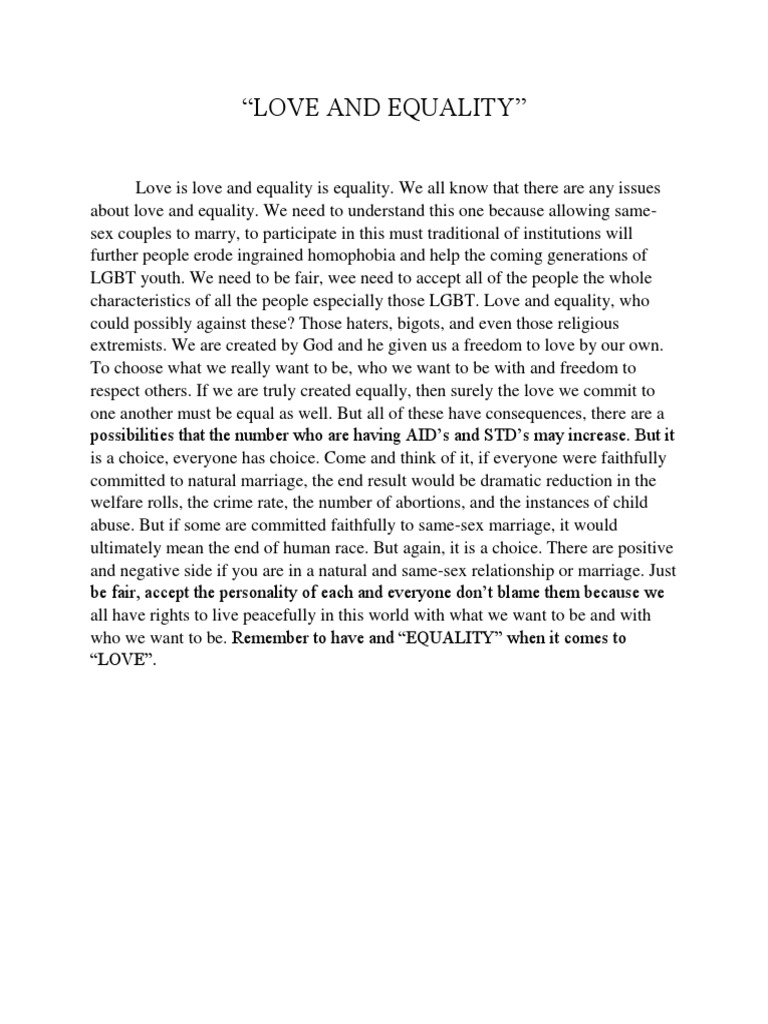In the realm of relationships, the Bahá’í teachings illuminate profound precepts regarding love and equality. These teachings are not merely theoretical; they invite practical application in the daily lives of couples. By assimilating these principles, partners can cultivate harmonious relationships that are both egalitarian and deeply fulfilling. This article explores the essence of equality in love and offers actionable insights for couples striving to practice this daily.
First and foremost, the Bahá’í perspective on equality emphasizes the intrinsic worth of every individual. In the context of romantic relationships, this foundation necessitates the recognition of each partner as an equal entity. Each person brings unique gifts and talents to the partnership, and acknowledging these attributes fosters an environment of mutual respect and admiration. This principle not only affirms the dignity of each individual but also serves as the bedrock for nurturing love. Couples can begin practicing equality by regularly expressing appreciation for each other’s contributions, thus reinforcing the sense of value both partners hold for one another.
Furthermore, the concept of equality transcends mere acknowledgment; it extends to the dynamics of decision-making within the relationship. Couples should endeavor to create a collaborative atmosphere where both voices are not only heard but resonate equally. This entails open discussions about shared goals, aspirations, and even mundane decisions that affect both parties. By fostering a culture of inclusivity, partners can develop a sense of ownership over their relationship’s direction, thereby enhancing the emotional connection they share. Engaging in regular dialogues about each partner’s perspectives strengthens unity and mitigates the potential for discord arising from misunderstandings.
Another salient aspect of practicing equality in love is the commitment to emotional support. In a Bahá’í context, love is not solely confined to romantic expressions; it encompasses a profound sense of support and empathy for one another’s emotional landscapes. This means being attuned to each other’s needs, attending to emotional fluctuations with kindness, and providing a sanctuary for vulnerability. Couples can uphold this practice by scheduling time for heart-to-heart conversations. In these dialogues, partners can share their feelings, aspirations, and anxieties without the fear of judgment, thereby fortifying their emotional bond.
Additionally, the Bahá’í teachings promote the idea of selfless service as a manifestation of love. Couples are encouraged to extend their love beyond their relationship and into their community. Engaging in service together can significantly enhance the quality of a couple’s relationship. Such activities can include volunteering at local charities, participating in community projects, or aiding those in need. By working together for a cause greater than themselves, couples not only solidify their bond but also practice a shared purpose that enriches their love. This exemplifies the synergy of equality, as serving others demands a level of teamwork and collaborative spirit that reflects the very essence of partnership.
In parallel, respecting individuality is paramount in the pursuit of equality. While love establishes a profound connection between partners, it is critical to honor personal space and individuality. In a world increasingly dominated by conformity, celebrating each other’s uniqueness can invigorate a relationship. Couples can encourage each other to pursue individual interests and passions while also seeking opportunities to grow together. Workshops, hobbies, and intellectual pursuits provide avenues for both partners to flourish independently and collectively. This dual focus on individuality and unity nurtures a balanced dynamic that is vital for sustained harmony.
Communication also plays an integral role in manifesting equality in love. It is essential for couples to engage in transparent and heartfelt dialogues regarding their feelings, expectations, and boundaries. Frequent check-ins can serve as a tool for gauging the relationship’s health, allowing both partners to express their thoughts openly. Furthermore, utilizing active listening techniques—where one partner fully engages and reflects the other’s sentiments—can fortify understanding and validation. This level of communication fosters an atmosphere characterized by safety and trust, essential for equal partnership.
Moreover, addressing conflicts with grace and a commitment to equity is vital for maintaining harmony. Disagreements are inevitable in any relationship, but how couples navigate these moments can either fortify or fracture their bond. Practicing equality involves approaching conflicts with a problem-solving attitude rather than a combative one. Couples should strive to understand each other’s viewpoints, actively seeking resolutions that honor both partners’ needs. Establishing ground rules for conflict, such as refraining from harmful language and adopting a constructive tone, can mitigate tensions and pave the way for fruitful debates. In this manner, challenges become opportunities for growth rather than sources of division.
Finally, embodying the principle of gratefulness is a transformative approach that couples can integrate into their daily lives. Expressing gratitude for one another can significantly enhance the emotional climate of a relationship. This practice not only reinforces the appreciation for each partner but also cultivates a positive outlook towards the relationship as a whole. Couples are encouraged to establish rituals of gratitude, whether through written expressions, spontaneous affirmations, or designated times to reflect on shared joys and achievements. By embedding this practice into their daily routine, partners nurture a profound sense of love that is deeply rooted in equity.
In conclusion, the Bahá’í teachings on equality provide a robust framework for couples aiming to cultivate enduring love. Through practices centered on mutual respect, collaboration, emotional support, and gratefulness, partners can embody the essence of equality in their relationship. The pursuit of equality is not a destination; rather, it is an ongoing journey that requires intention and commitment. By adhering to these principles, couples can foster a transformative love that not only enriches their lives but also serves as a beacon of equality and harmony in the broader community.
